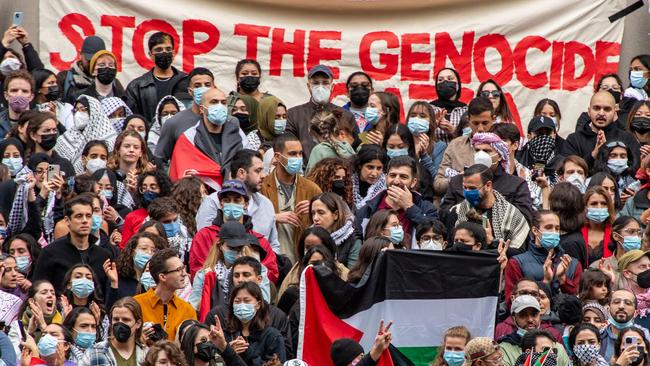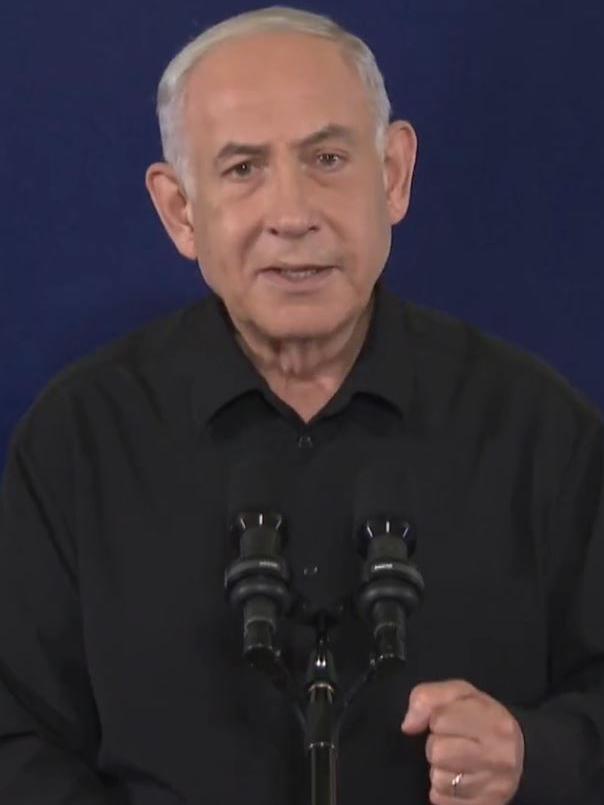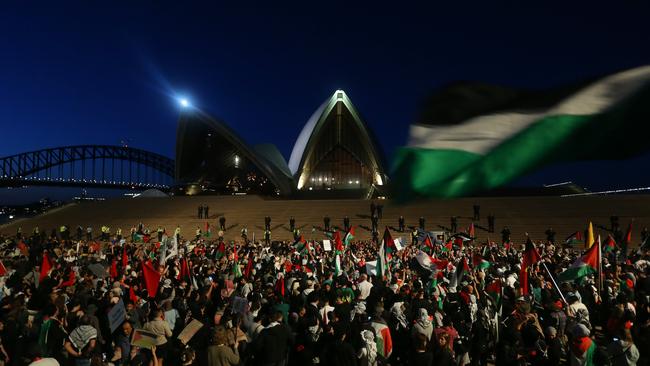
This ideology is now pervasive. Many people who chant its slogans grasp neither its origins nor its distortions. The paradox of Israel’s position is its classification by its opponents as a colonial oppressor power that practices racism and genocide.
With Hamas reporting more than 12,000 civilians killed – and television images across the globe – the optics can reinforce such impressions. An Israeli war campaign to defeat Hamas slots perfectly into the identity politics narrative in the West casting Israel as an oppressor power where resistance becomes a moral cause.
On display in the Israel-Hamas war is how much the global left has embraced the Palestinian cause as its own and is filled with an ideology and rhetoric that has the potential for immense appeal among Western publics.
A generation ago left-wing politics was fused in a universal concept of human nature – that it was wrong to define and treat people on the basis of race, sex, gender or religion – and that right-wing prejudice against people on such criteria must be repudiated. But that was yesterday – before postmodernism, postcolonialism and critical race theory fuelled the furnace of identity politics. So fast has been this transformation that many people do not comprehend how much their attitudes are now formed by the march of the new ideology.
In his recent book, The Identity Trap, writer and academic Yascha Mounk traces the origins of what he calls the identity synthesis and the reasons for its appeal. He argues the more people belong to identity groups pitted against each other in a zero-sum struggle, the more damage will be done to our societies and the harder it will be to sustain successful multicultural nations.
The current war is not just about Israel and Hamas – it is about Western societies such as Australia in terms of our reactions and our values. Mounk’s core insight is a big idea – identity politics is incompatible with a diverse and multicultural society. He calls the identity synthesis a trap.
He says the hopes of people that the path to respect lies in defining their identity within a specific group is the path to disillusion. It is also a direct threat to the contemporary West – if the idea takes hold then it will undermine a fair and tolerant society and runs the ultimate danger that what divides us becomes more important than what unites us.
“The fight over the future of the identity synthesis will be one of the defining struggles of the coming decades,” Mounk says. The speed at which these ideas have moved from university campuses to win acceptance among elites – corporate leaders, cultural and media leaders and politicians – has been astonishing. Australia lags both the US and Britain but the direction is obvious.

There is a natural tendency to seek better representation of minorities in institutions. But there is also an identity politics ideology at work – it says universal values and rules are the means by which privileged groups keep minorities marginalised; it says real progress comes only via the power of identity groups; it says governments and elites must have different policies and rules according to the identity of the individual.
Mounk says US states are now differentiating benefits for people depending on their racial group. Medicines and health access is starting to be determined according to race. The ideology has multiple dimensions. Denial of objective truth is fundamental – this attacks the basis of objectivity that sustains liberal universal values. Laws and policies that fail to distinguish between historically oppressed and historically oppressors are said to perpetuate injustice.
In the US the notion of “white privilege” has taken hold and gained traction, notably among white elites. Mounk calls the spread of these ideas “the short march through the institutions”. Writing in The Times he says activists split the world into two groups: “white people”, who are historically responsible for the most of the world’s evils; and “people of colour”, defined by their victimhood despite being scattered across continents.
At the same time racism is redefined as structural in nature, not personal – a victim group cannot be racist towards a privileged group. Racism can exist only in the reverse application. Finally, all forms of oppression are connected – this is the theory of intersectionality. It says activists must grasp that the historically privileged must be confronted on all forms of oppression at the same time. If you fight racial oppression, the power reality says you must fight sexual oppression.
Translating this ideology to the current conflict, Mounk says: “According to the global left, Jews are white. Israel is a European settler colony repeating the crimes once committed by Americans and Australians. Since Palestinians are people of colour who have suffered settler colonialism, they are incapable of being racist and are justified in inflicting any amount of suffering on their oppressors.

“And if you want to be a good feminist or environmentalist – or merely an artist or academic in good standing with the juste milieu – it is your duty to sign an open letter, join a solidarity rally and make common cause with a theocratic terrorist group that happens to be diametrically opposed to every value you claim to cherish.”
This ideology is a false and pernicious prism through which to see the world. It is distorting, not illuminating. Not all Israelis are white. Trying to squeeze Israel’s history into that of a new world settler state is absurd since Jews, along with Palestinians, have an existence within the region over thousands of years. Moreover, more than 20 per cent of people in Israel are Arabs, participating as full citizens.
Among Palestinians there is anti-Jewish racism just as there is Jewish racism towards Palestinians. As Mounk says, the identity thesis is dressed up in postcolonial clothes but its case against Israel shows “it is itself a neo-colonial enterprise”. And seeing the cause of LGBTI justice marching on behalf of Hamas and a Free Palestine testifies to the political blindness and false equivalence on display.
Yet depicting Israel as the colonial, racist, oppressor power is pivotal in the campaign to delegitimise the country. Indeed, it offers an ideological justification for the barbarous goal of Hamas to eliminate Israel as a state. If Israel is illegitimate then it does not deserve to survive – this is the ideological message. It is identity politics that partly explains why since the attack by Hamas on October 7 there has been such a lack of sympathy or moral regard for Israel.
The world is complex, filled with different perspectives with degrees of justice on both sides. But the identity synthesis seeks to destroy truth and complexity by advancing an anti-Israeli vision seeking to justify the murderous elimination of a nation. Mounk nails the core point: “What’s remarkable about the identity synthesis is that it furnishes its adherents with the ideological categories that allow them to sanctify the worst of those instincts, from rank indifference towards suffering to an outright celebration of sadism.”
He says it is “impossible to ascertain a person’s moral worth by observing the group into which they were born” because the world is not “neatly split into Manichean binaries that pit colonisers against the colonised or white people against people of colour”.
Israel is not just fighting Hamas, not just fighting an information war. It is fighting an identity ideology that denies its legitimacy. Moreover, to the extent such ideology gains a foothold in Western nations such as Australia, it threatens to tear apart their contemporary multicultural foundations. And what are our leaders doing? They seem stuck in weasel words and weakness.








Israel is not just fighting a war where civilian deaths guarantee an international backlash – it is fighting the cultural revolution in Western democracies that enshrines the ideology of identity politics based on the stereotype of oppressor and oppressed.